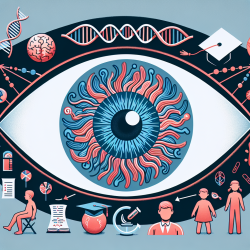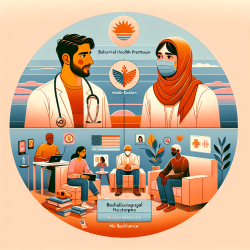Introduction
The 2014–2015 Ebola outbreak in West Africa was a pivotal event that underscored the critical importance of infection control, community engagement, and international collaboration in managing health crises. While the outbreak primarily affected public health sectors, the lessons learned can be applied across various fields, including online therapy services provided by companies like TinyEYE. By examining the research presented in "The 2014–2015 Ebola outbreak in West Africa: Hands On," we can identify strategies to enhance the effectiveness and reach of online therapy services, particularly in educational settings.
Key Lessons and Their Application to Online Therapy
One of the significant outcomes of the Ebola outbreak was the realization of the need for robust infection prevention and control (IPC) measures. This lesson is particularly relevant for online therapy services, which can play a crucial role in maintaining continuity of care during infectious disease outbreaks or other emergencies that disrupt traditional in-person services.
- Data-Driven Decision Making: The outbreak highlighted the importance of using data to drive decisions. For online therapy providers, this means leveraging data analytics to track therapy outcomes, engagement levels, and areas for improvement. By adopting a data-driven approach, practitioners can tailor interventions to meet the specific needs of each child, ensuring better outcomes.
- Community Engagement: The success of public health interventions during the Ebola outbreak was partly due to effective community engagement. Similarly, online therapy services can benefit from engaging with school communities, parents, and educators to ensure that therapy goals align with educational objectives and community needs.
- Interdisciplinary Collaboration: The Ebola response involved collaboration across various sectors, including healthcare, government, and international organizations. Online therapy providers can adopt a similar approach by collaborating with educators, healthcare professionals, and technology experts to enhance service delivery and address any barriers to access.
Encouraging Further Research
The research paper concludes that more studies are needed to understand the pathogenesis and treatment of Ebola virus disease (EVD). Similarly, there is a need for ongoing research into the effectiveness of online therapy services, particularly in diverse educational settings. Practitioners are encouraged to participate in research initiatives, share data, and contribute to the growing body of evidence supporting online therapy's efficacy.
Conclusion
The 2014–2015 Ebola outbreak provides valuable lessons that can be applied to enhance online therapy services. By focusing on data-driven decisions, community engagement, and interdisciplinary collaboration, practitioners can improve outcomes for children and ensure continuity of care during challenging times. To read the original research paper, please follow this link: The 2014–2015 Ebola outbreak in West Africa: Hands On.










